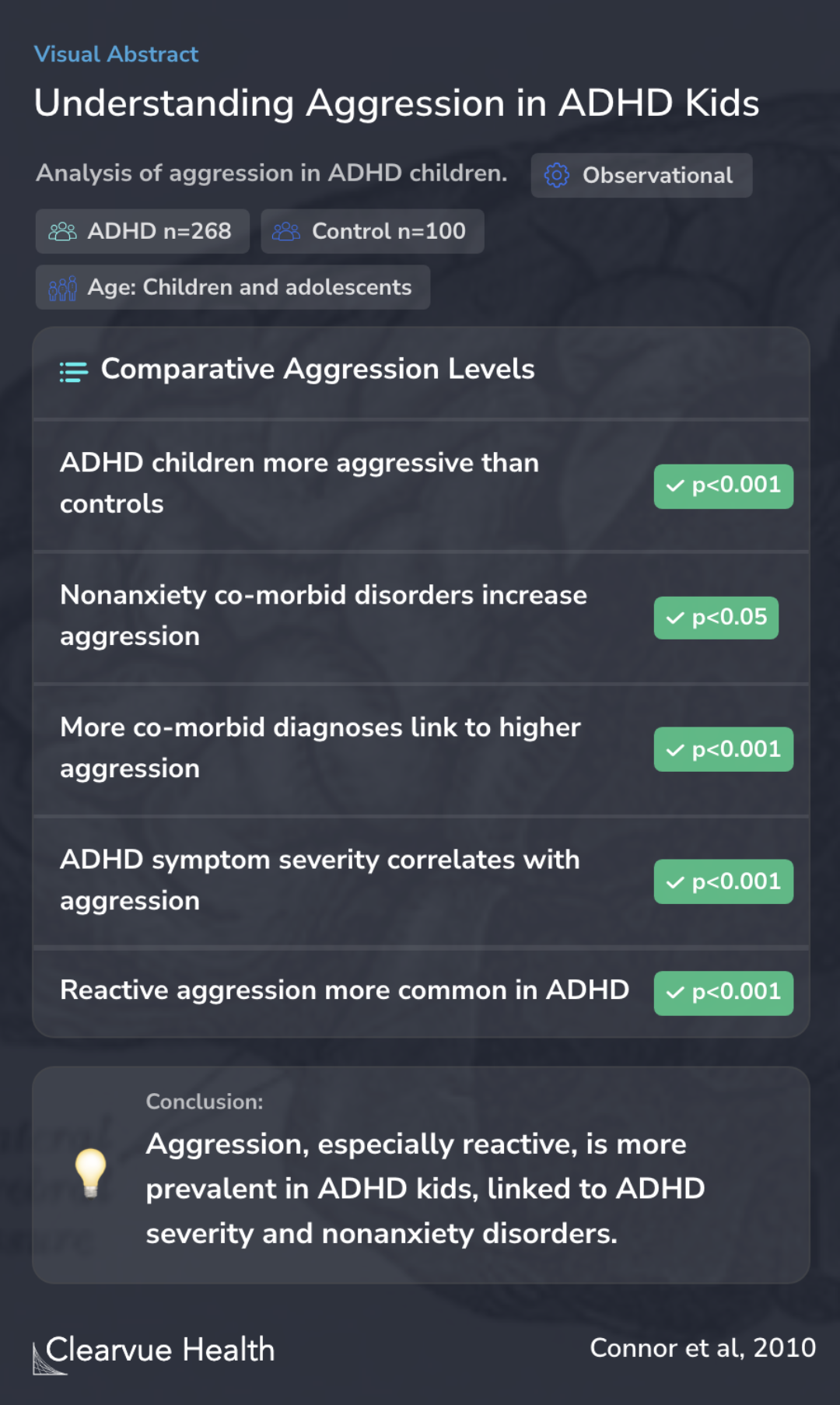Dark
Visual Abstract
Impulsive aggression in attention-deficit/hyperactivity disorder: symptom severity, co-morbidity, and attention-deficit/hyperactivity disorder subtype
Understanding Aggression in ADHD Kids
Connor DF, Chartier KG, Preen EC, Kaplan RF
Summarized by:
January 8, 2024
study source
J Child Adolesc Psychopharmacol
2010 Apr

🔎
What they studied
The study aimed to understand aggression in ADHD kids and its link to other psychiatric issues and ADHD types.
💡
What they found
ADHD children showed more aggression, especially those with nonanxiety disorders, and reactive aggression was more common.
👩⚕️
Why it matters
The findings suggest that aggression in ADHD kids, particularly those with certain disorders, is a significant issue.
Objectives
The study aimed to understand aggression, especially impulsive aggression, in young people with ADHD. Impulsive Aggression (IA) in ADHD is like a sudden burst of anger, usually more intense compared to what other kids the same age feel. This type of aggression is a key part of ADHD, and it's very common. The study also looked at how aggression links to other mental health issues in kids with ADHD, whether it's different based on the type of ADHD they have, and how severe their ADHD symptoms are. The researchers wanted to find out if this impulsive or reactive aggression is seen more often than planned or proactive aggression in kids and teenagers with ADHD.
Study Quote
The aim of this study was to characterize aggression and its relationship to psychiatric co-morbidity, attention-deficit/hyperactivity disorder (ADHD) subtype, and ADHD symptom severity in clinically referred ADHD youngsters. We also wanted to ascertain whether reactive and impulsive agg...
Show More
Methods
The researchers looked at 268 children and teenagers with ADHD and compared them with 100 kids and teenagers who didn't have ADHD. They checked things like where they live, other mental health diagnoses, and how aggressive they were. They did this using methods like correlational analysis and ANCOVA, which are ways to see if different things are connected or if one thing affects another. The main goal was to see how aggression in kids with ADHD compares to those without it, and if ADHD symptoms are linked to how aggressive they are.
Study Quote
Consecutively referred ADHD children and adolescents (n = 268) and community controls (n = 100) were assessed systematically regarding demographics, psychiatric diagnosis, overt aggression severity, proactive and reactive aggression severity, and ADHD symptom severity using correlational...
Show More
Results
The study found that kids with ADHD were generally more aggressive than those without ADHD. This was especially true for kids with ADHD who also had other mental health issues, but not anxiety. The more mental health problems a kid with ADHD had, the more aggressive they tended to be. The severity of their ADHD symptoms was also linked to how aggressive they were. Most importantly, these kids showed more reactive or impulsive aggression than planned aggression. This tells us that kids with ADHD often react aggressively without thinking ahead.
Study Quote
Across all aggression measures, ADHD children were more aggressive than community controls. ADHD children with nonanxiety co-morbid disorders were more aggressive than ADHD children without such co-morbidity. The number of co-morbid psychiatric diagnoses and ADHD symptom severity were si...
Show More
Conclusions
Aggression, particularly the impulsive kind, is more common in kids with ADHD. This aggression is linked to how severe their ADHD is and whether they have other mental health issues that aren't anxiety. This study highlights the need to treat aggression as a key part of ADHD, especially in children and teenagers with more severe ADHD and additional mental health diagnoses.
Study Quote
Aggression is common in clinically referred ADHD youngsters and should be identified as a legitimate target for psychopharmacological treatment in children and adolescents with moderate to severe ADHD and nonanxiety co-morbid diagnostic disorders.
Key Takeaways
Aggression Prevalent in ADHD
ADHD children show higher aggression levels, needing focused treatment.
Reactive Aggression Dominates
ADHD kids more often show reactive than proactive aggression.
Severity Linked to Co-morbidities
Higher aggression is linked with nonanxiety co-morbid disorders in ADHD.
Context
Looking at ADHD more broadly, we see that different types of ADHD affect kids in various ways. For instance, boys with Combined type ADHD, which includes both inattentiveness and hyperactivity, might face more anxiety and depression. This affects their life at school and with friends. However, this Combined type often responds better to treatment. On the other hand, children with the Inattentive type of ADHD tend to be less aggressive. This study's findings add to our understanding by showing how impulsive aggression is especially significant in ADHD, impacting how these kids act and react in everyday situations.
Aggression in ADHD has also been seen in other areas, including driving, where ADHD has been linked with more aggressive and more dangerous driving.